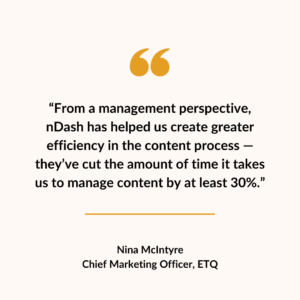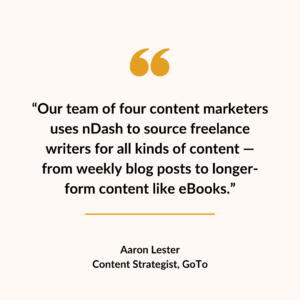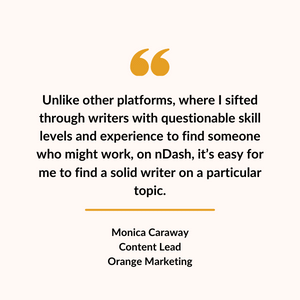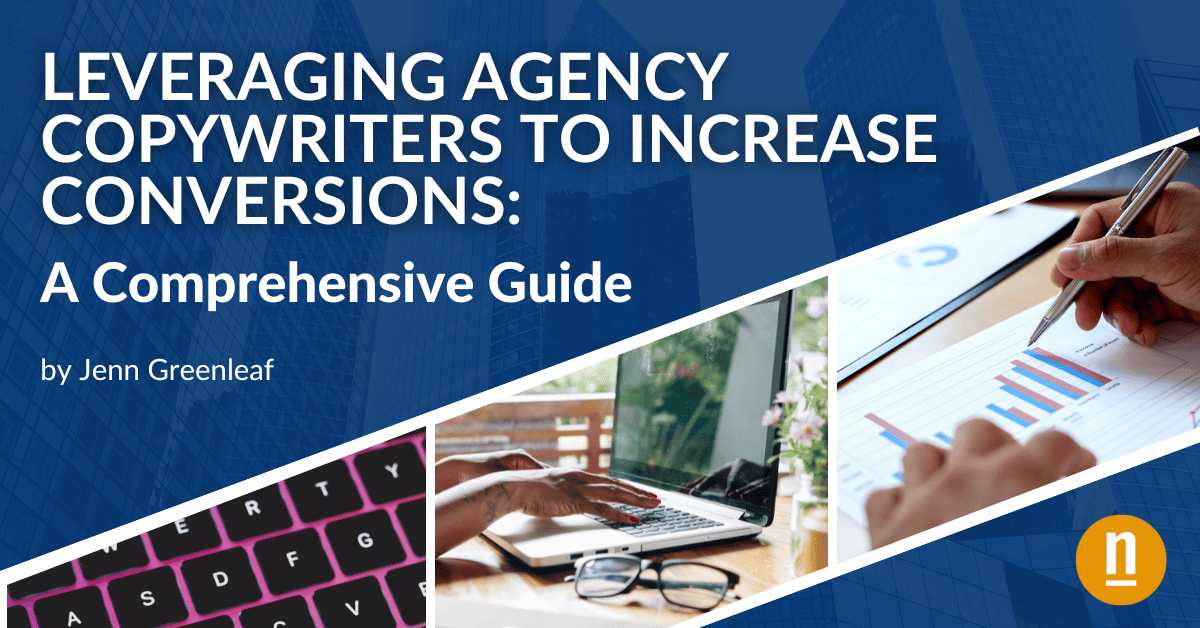This guide covers strategies and techniques for harnessing the expertise of agency copywriters to boost conversion rates.
Benefits of Leveraging Agency Copywriters
Are you looking to enhance your marketing and communication efforts?
Leverage agency copywriters.
These professionals specialize in crafting compelling and persuasive content that engages your target audience. Whether you need copy for websites, social media, advertisements, or other marketing materials, agency copywriters can help you achieve your goals.
Here are some key benefits of leveraging agency copywriters:
Expertise and Specialization
Agency copywriters, particularly those with niche industry experience, possess a wealth of expertise in creating impactful copy.
But what does that mean exactly? They’re skilled in understanding your brand’s:
- Unique voice
- Tone
- Messaging
So, they can effectively communicate your brand’s story and values, capturing the attention of your target audience.
Agency Copywriters Offer Fresh Perspectives
One of my favorite quotes is by Epictetus, “It is impossible for a man to learn what he thinks he already knows.” I bring this up because it’s impossible for us to think of or “know,” or share the same perspectives about everything.
Sometimes, we need an outside perspective – these professionals bring that and more to your marketing efforts. This fresh outlook can be invaluable in developing comprehensive content strategies. They can provide a unique angle to your messaging and offer new ideas that may not have been considered.
 Save Time and Resource Efficiency
Save Time and Resource Efficiency
We all want to save time and resources. Instead of allocating internal staff to handle copywriting tasks, outsource these responsibilities to those dedicated to delivering high-quality content. Doing so allows your team to focus on other responsibilities while ensuring your copy receives the attention it deserves.
Flexibility and Scalability
Agencies often have a team of freelance copywriters available, allowing them to scale their resources based on your needs. Whether you require a one-time project or ongoing support, agencies can accommodate and deliver consistent results. This flexibility ensures your needs are met, regardless of fluctuations in workload or deadlines.
Agency Copywriters Possess a Variety of Skill Sets
Do you need long-form blog posts, concise social media copy, or persuasive sales copy? Content creation platforms can provide the right talent to match your content requirements. This versatility allows you to leverage their expertise across various platforms and channels, ensuring consistent messaging across your marketing efforts.
How Agency Copywriters Boost Conversions
An agency copywriter’s expertise is crafting persuasive and compelling content that effectively communicates the value and benefits of products or services to target audiences. By using various writing techniques, psychological triggers, and strategic messaging, agency copywriters can significantly enhance conversion rates. Let’s look at how:
Understanding the Target Audience
Copywriters conduct thorough research to gain a deep understanding of the target audience. They delve into demographics, psychographics, and buyer personas to tailor the messaging accordingly. This comprehensive understanding enables them to create targeted copy that resonates with the audience and compels them to take action.
Agency Copywriters Craft Compelling Headlines and Hooks
An invaluable skill of agency copywriters is crafting attention-grabbing headlines and hooks that captivate the reader’s interest. Personally, I love it when I send an assignment to a writer, and they offer unique (often better) title suggestions for the content.
Writers excel at using powerful language, emotional triggers, and curiosity to entice the audience and make them want to learn more. Engaging headlines and hooks significantly increase click-through rates, ultimately leading to higher conversions.
Clear and Concise Messaging
Copywriters understand the importance of conveying the key selling points clearly and concisely. They:
- Eliminate jargon
- Simplify complex ideas
- Highlight benefits rather than features
By presenting information in a straightforward way, copywriters make it easier for readers to understand the value proposition, resulting in improved conversions.
Persuasive Calls to Action (CTAs)
Crafting compelling calls to action is a core skill of agency copywriters. They create persuasive CTAs that clearly state the desired action and highlight the benefits of taking that action. When using action-oriented language and incorporating a sense of urgency, copywriters motivate readers to act immediately, leading to higher conversion rates.
Emotional Appeal
Copywriters tap into emotions to create a connection with the audience. They use storytelling techniques, empathy, and relatable scenarios to evoke emotions and make the copy more compelling. When readers feel emotionally connected to content, they’re more likely to convert.
 SEO Integration
SEO Integration
Copywriters can incorporate relevant keywords and optimize content for search engine visibility. By creating SEO-friendly copy, they can assist in improving organic rankings and driving targeted traffic. Increased visibility and relevant traffic enhance the likelihood of conversions.
Consistency and Brand Voice
Maintaining consistency in messaging and brand voice is vital for agency copywriters. They ensure the copy consistently aligns with the brand’s voice and tone.
Copywriters reinforce brand recognition and trust by upholding brand consistency across various marketing channels. Consistent messaging strengthens the brand’s identity and fosters a cohesive customer experience, positively impacting conversions.
Best Practices for Collaborating With Agency Copywriters
Collaborating effectively with agency copywriters is crucial for producing high-quality and impactful content. Here are several best practices to ensure a successful collaboration:
Establish Clear Communication Channels
Open and transparent communication is imperative when working with agency copywriters. Clearly define expectations, goals, and timelines right from the start. But, sometimes, things might change.
For example, suppose a client contacts me asking for a change in an assignment we have in progress with a writer. In that case, I follow several steps to ensure everything is clear by:
- Responding to the client that I have their request and am sending it to the writer
- Contacting the writer immediately on the nDash platform with notes from the client
- Adding relevant notes and changes to the content brief the writer is working from
Regularly scheduled check-ins or meetings can help keep everyone on the same page and promptly address any questions or concerns. Providing timely feedback and constructive criticism is also important to guide the copywriter’s work and ensure it aligns with your brand’s tone and objectives.
Share Comprehensive Content Briefs
One of my favorite things to do as a managing editor is to create content briefs. Why? I want to ensure the writers I’m working with have all the information they need to deliver top-quality content to our clients.
A well-written and detailed content brief sets the foundation for a successful collaboration. Clearly articulate the project’s:
- Scope
- Target audience
- Key messages
- Specific requirements (i.e., linking, keywords, source materials, etc.)
Include examples of previous work or preferred writing styles to give the copywriter a better sense of your brand’s voice and tone.
Foster a Collaborative Environment
Treat agency copywriters as valued team members and create an atmosphere encouraging collaboration and creativity. They’re the backbone of the content creation process. Here are some tips for fostering a collaborative environment:
- Involve them in brainstorming or creative discussions to leverage their expertise and insights.
- Be open to their suggestions and ideas while providing guidance and direction.
- Recognize and appreciate their contributions, which helps build a positive working relationship and motivates them to produce their best work.
Steps For Vetting the Right Agency Copywriters
Given an agency copywriter’s diverse skills and expertise, the vetting process can be challenging. Here are some quick steps for streamlining the process:
- Clearly Define Your Needs: Before searching for an agency copywriter, determine your specific requirements. Understand the type of content you need, like website copy, blog articles, social media posts, or ad campaigns.
- Review Writing Portfolios: Ask potential agency copywriters to provide samples. Look for writing styles, tones, and formats that resonate with your brand’s voice and objectives.
- Check for Industry Experience: Consider copywriters with industry experience. They’ll better understand your target audience, key messages, and industry-specific terminology.
- Assess Communication Skills: Effective communication is indispensable for successful collaboration. Evaluate the copywriter’s responsiveness, clarity, and ability to ask relevant questions during vetting.
Collaboration Strategies For Best Results
Effective collaboration strategies are crucial when working with an agency copywriter. Clear communication and a shared understanding of project goals ensure that the copywriter can accurately convey the desired message and brand voice. Collaborating closely also allows for the exchange of ideas and perspectives, leading to innovative and compelling copy that resonates with the target audience.
Provide Ample Information About Your Offerings, Audience, and Company Branding
- Clearly communicate your product or service features, unique selling points, and benefits. Help the copywriter understand what sets your offerings apart from competitors.
- Share insights about your target audience, including demographics, interests, pain points, and preferred communication channels.
- Discuss your company’s branding guidelines, style preferences, and tone of voice. Provide examples of existing content that reflects your brand identity.
Regular Review and Feedback Process
- Establish a timeline and checkpoints for content review throughout the collaboration. This helps ensure that the copywriter stays on track and meets your expectations.
- Provide constructive feedback on drafts, highlighting the positive aspects and areas needing improvement. Be specific and clear in your feedback to help the copywriter refine their work.
- Maintain a collaborative and respectful atmosphere to foster a productive working relationship. That involves encouraging open communication and addressing concerns promptly.
Additional Tips for Success
- Maintain a shared document or project management system where you and the copywriter can access and collaborate on content.
- Schedule regular check-ins or status meetings to discuss progress, address questions, and provide additional guidance if needed.
- Be open to suggestions and ideas from agency copywriters. Their expertise may offer valuable insights that can enhance your content.
Measuring the Effectiveness of Agency Copywriters
 Copywriters play a pivotal role in crafting persuasive and compelling content that drives engagement, conveys brand messages, and leads to desired actions.
Copywriters play a pivotal role in crafting persuasive and compelling content that drives engagement, conveys brand messages, and leads to desired actions.
Evaluating their effectiveness allows agencies to assess clients’ return on investment (ROI), make data-driven decisions, and continuously improve their copywriting strategies.
According to a report from Semrush, 70% of companies that are the most successful in content marketing measure their ROI. Evaluating copywriters’ efforts helps agencies and marketers determine if their content aligns with campaign goals and resonates with the target audience. It identifies high-performing copywriters and enables the replication of successful strategies.
By tracking click-through rates (CTRs), conversion rates, and engagement levels, agencies determine the impact of copywriters’ work on desired outcomes. This showcases the agency’s value, justifies resource allocation, and builds trust-based relationships with clients.
This evaluation also optimizes content development processes. Analyzing performance data helps identify patterns, trends, and best practices. Agencies refine their strategies, address areas for improvement, and align efforts with market trends and preferences.
Key Performance Indicators (KPIs) to Measure Copywriting Success
When measuring copywriting success, several key performance indicators (KPIs) can be considered to evaluate the effectiveness of the copy and its impact on achieving marketing goals. Here are some KPIs commonly used to measure copywriting success:
- Conversion Rate: The percentage of people who decide to act after reading the copy, like filling out a form, purchasing, or subscribing to a newsletter. A higher conversion rate indicates that the copy is persuasive and effective.
- CTR: The percentage of people clicking on a link or CTA within the copy. It helps determine how engaging the copy is and whether it compels readers to take the next step.
- Engagement Metrics: These include average time on page, bounce rate, and scroll depth. They indicate how well the copy captures readers’ attention and keeps them engaged. Higher engagement metrics generally suggest the copy is interesting, relevant, and valuable to the target audience.
- Social Shares: This measures the number of times the copy is shared on social media platforms or goes viral. It indicates that the copy resonates with readers and can reach a wider audience, increasing brand visibility and awareness.
- Brand Awareness: Surveys or sentiment analysis can help measure the impact of copywriting on brand awareness and recall. By assessing how well the copy communicates the brand’s message, positioning, and values, it can be determined if it effectively strengthens brand recognition and recalls among the target audience.
- SEO Performance: If the copy is intended for online platforms, measuring its impact on search engine optimization (SEO) can be valuable. Metrics like keyword rankings, organic traffic, and backlinks can indicate how well the copy is optimized for search engines and whether it attracts relevant organic traffic.
- ROI: By tracking the revenue generated or cost savings resulting from the copy, it’s possible to determine its overall effectiveness and ROI.
Using Analytics Tools to Track Conversions and Assess Copy Effectiveness
To track conversions and measure copy effectiveness, you can use various analytics tools that provide insights into user behavior, conversion rates, and other relevant metrics. Here’s an overview of how to use analytics tools for this purpose:
- Set up Goals or Conversion Tracking: In your analytics tool, define the goals or conversions you want to track. This could be a purchase, form submission, newsletter sign-up, or other desired action.
- Implement Tracking Codes: Place the appropriate tracking codes provided by your analytics tool on the relevant pages of your website. This typically involves adding JavaScript or HTML code snippets to track user interactions.
- Monitor Conversion Data: Once the tracking codes are in place, your analytics tool will start collecting data on conversions. Access the conversion data dashboard or reports to see how many conversions occur and analyze trends over time.
- Segment Conversion Data: Use segmentation features within your analytics tool to break down the conversion data by variables like traffic sources, demographics, devices, or landing pages. This helps you understand which segments drive the most conversions and identify areas for improvement.
- Analyze Conversion Funnels: Many analytics tools offer the ability to create conversion funnels, which allow you to track the step-by-step journey users take before converting. Analyzing the funnel can help identify bottlenecks or areas where users drop off, enabling you to optimize those stages for better conversions.
- Monitor Engagement Metrics: Besides conversions, pay attention to engagement metrics like click-through rates, time on page, or bounce rates. These metrics provide insights regarding user interactions with your copy and whether it resonates with them.
- Continuously Optimize Copy: Based on the insights gathered from the analytics tools, make data-driven decisions to refine your copy. Experiment with different headlines, CTAs (call-to-actions), and messaging to improve conversion rates and overall effectiveness.
Partner With nDash and Leverage Elite Agency Copywriters
Our extensive talent pool contains thousands of elite content creators, all in a searchable database. In addition to finding top talent, you’ll have access to their writing profile – which contains information about their background, topics they cover, writing samples, and more. Sign up today to learn how working with agency copywriters can level up your content strategy.

